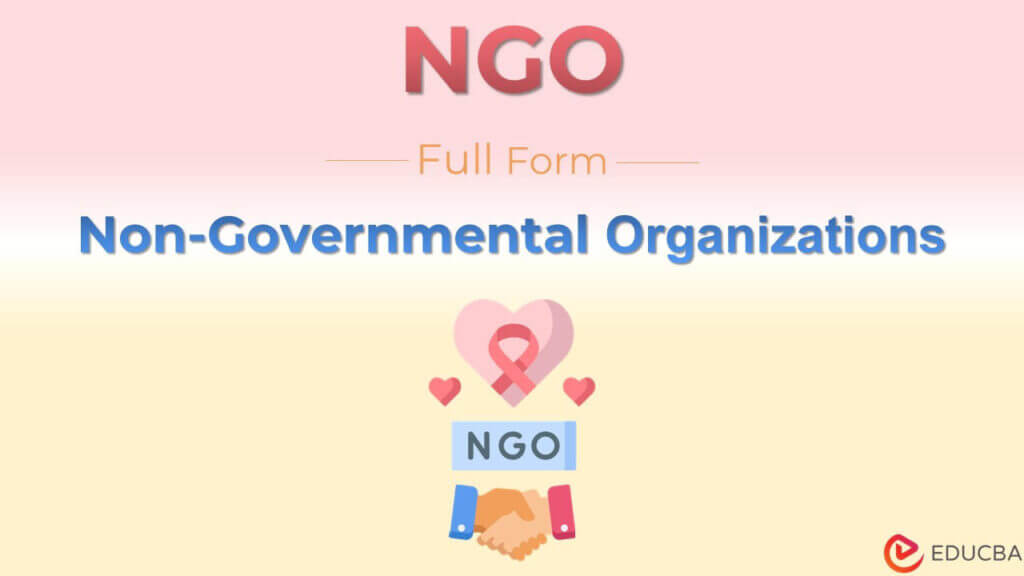Updated February 9, 2023
Full Form of NGO (Non-Governmental Organization)
NGO deduced from its full form Non-Governmental Organization, plays an essential role in global development, charity, and philanthropy. They are frequently non-profit organizations with annual budgets within millions or even billions of dollars. These organizations are purpose-driven, with several volunteers and helpers. NGOs get funds from several sources, including individual donations, registration fees, and government subsidies. There are several types of NGOs, each running with its set goals. Here are some exciting things to learn about NGOs.
What is an NGO?
Full Form of NGO (Non-Governmental Organization) is a group that operates freely, irrespective of any authority. The word was established in 1945 by the United Nations (UN) to differentiate between government and commercial organizations. NGOs are often created by private persons with a specific goal or purpose and utilize their platforms for non-profit campaigning. There are bigger and smaller groups, some that operate locally or globally, some that focus solely on one cause, and others that work for many issues.
The number of non-governmental organizations and their impact in many areas has grown significantly during the last decade. These organizations now function locally and serve as experts to governments, international bodies, and even the United Nations.
How Does an NGO Work?
A non-governmental organization, or NGO, is a collection of people who want to accomplish aims and objectives for the public, societal, or economic benefit of a country or the world. NGOs work on a variety of issues and topics. These include equality between men and women, environmental and global health, universal health care, political activism, labor unions, religious faith, aging adult care, and youth engagement. Although the government is not associated with the pursuits of non-governmental organizations (NGOs), authorities usually monitor them through the filing of data returns which illustrate an NGO’s financial support, governance, and operations.
NGO vs. NPO
Though the terms are frequently used together, non-governmental organizations (NGOs) and non-profit organizations (NPOs) have unique characteristics and operate differently.
- While an NGO is a group formed to function independently of the government, an NPO is a group or organization formed for a cause apart from profit.
- As previously stated, an NGO works on a regional, national, or worldwide level with no control, involvement, or influence from that government. An NPO often aims to gather significant finances to deliver goods and services to the public, but revenue is absent for the organization’s employees or directors.
- When assessing the two organizations, remember that several NGOs are sometimes non-profits; however, only a few NPOs are NGOs.
NGOs and their Types
There are several types of NGOs existing worldwide.
- INGO: An INGO is an international non-governmental organization. For example, the Council of Europe’s Conference of INGOs has over 300 members INGOs.
- GONGO: GONGO is a dismissive term for a government-organized non-governmental organization. GONGOs are government-backed non-governmental organizations established to campaign in favor of a repressive state in the global domain, according to Foreign Policy.
- QUANGO: Mostly a British phrase that is typically controversial. A quasi-autonomous non-governmental organization (quango) receives public support. The government is responsible for appointing its highest officials.
- ENGO: An environmental non-governmental organization, such as Greenpeace or The World Wildlife Fund. In addition to working for the environment, both organizations operate globally. They are known as just NGOs.
- BINGO: Business and Industry NGO is a non-governmental organization set up by business or industry organizations to advocate their aggregate interests in other contexts or interactions with other parties, including the Global Climate Coalition.
- DONGO: Donor Organized NGO is an NGO established by a donor entity to conduct certain operations which are often limited to a single nation.
Duties of NGOs
NGOs must follow some essential values and beliefs to achieve aims and purposes. Given the importance of non-governmental organizations (NGOs) in all aspects of development, they must be open and responsible about their actions.
- Ensure that all participants, partners, and recipients of the NGO’s initiatives are informed about the organization’s finances, activities, and aims. It enhances trust among all involved parties and adds to the NGO’s victory.
- An NGO must be candid about its projects and initiatives. This openness includes data on the whereabouts of the organization’s financing, how it runs from within, and who it assists. The data should be freely available and transparent to all parties involved.
- An NGO and the individuals who work for it must be accountable for its multiple interests, funds, policy, and other activities.
Conclusion – Full Form of NGO
NGOs and similar groups are found all over the world. An organization regarded as an NGO in one nation may not be considered an NGO in another due to legal rules, permissible activities, supervision, and monitoring differences. The title can refer to a wide range of organizations. However, the one thing common among all the NGOs in the world is their contribution towards the betterment of the world.

